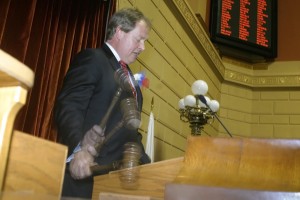
When I was younger and more naive, I wrote a post on these humble pages blaming Don Carcieri for our state’s sudden turn to right-wing politics, austerity, and high unemployment. I called it “The Carcieri Effect.” I got quite a bit of flack for writing that. As critics pointed out, the governor does not have a whole lot of power in Rhode Island, and the real power lies with the General Assembly, especially the House of Representatives. To a great extent, my critics argued, it was the Democrats in the state legislature who pushed those policies.
They were right, and I was wrong.
What originally led me to think Carcieri was responsible was that 2003, the year he took office, was the year when we turned the corner and began to fall behind. That really is true. But something else happened in 2003, something far more important.
Bill Murphy became House Speaker.
A conservative Democrat from West Warwick, Murphy was the man who proposed the tax cuts for the rich and got them passed. Carcieri may have played a role, but he was not the main factor.
As Steven Stycos wrote in the Phoenix at the time:
Murphy’s election, combined with the victory of Republican Governor Donald Carcieri and the 2000 ascension of state Senator William Irons (D-East Providence) to Senate majority leader (and soon to the newly created position of Senate president) gives Rhode Island its most conservative state leadership in more than a decade.
It was not the Carcieri Effect. It was the Murphy Effect.

